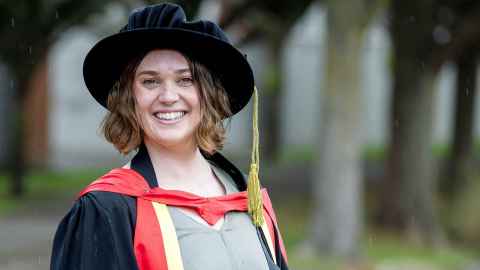Forensics graduate joins search for Vietnam's missing
7 May 2024
Dr Bethany Forsythe's expertise will help efforts to identify human remains from war in Vietnam.

A young New Zealand scientist has joined the International Commission on Missing Persons (ICMP) to lead the development of tools for the large-scale identification of human remains, including more than 300,000 people still missing after the Vietnam War.
Dr Bethany Forsythe (31), who graduated from Waipapa Taumata Rau, University of Auckland on 6 May with a PhD in Forensic Science, is helping the ICMP to establish DNA sequencing methods for highly degraded bone samples.
The Vietnamese remains date back to a war which ended in 1975.
“I’m privileged to be involved in this important work that can help to bring closure to the families of the missing,” says Bethany, who works with scientists and officials in both Hanoi, Vietnam, and at the commission’s headquarters in The Hague in the Netherlands, where she is based.
A two-year project to develop Vietnam’s capabilities is being carried out with the Institute of Biotechnology of the Vietnam Academy of Science and Technology and is funded by the United States Agency for International Development (USAID).
The technologies being evaluated and optimised will form the basis for a comprehensive system for comparing DNA from human remains with the DNA from even distant family members still searching for loved ones in Vietnam.
I have been very lucky to work with and learn from amazing forensic scientists in New Zealand.
“Cutting-edge extraction techniques and DNA sequencing technology have made it possible to collect usable DNA from highly degraded samples,” says Bethany. “This is something we have shown already with powerful nuclear DNA profiles obtained from some initial bone samples from Vietnam.”
She credits the Forensic Science Programme at Waipapa Taumata Rau and the government’s Institute of Environmental Science and Research (ESR) for the skills which enabled her to take on the challenge.
“I have been very lucky to work with and learn from amazing forensic scientists in New Zealand.”
A close association with the ESR, where she has worked and carried out academic research, is an extremely valuable part of the University’s forensics programme, she says.
The former Wellington East Girls High School pupil pursued forensics because she loved science and research and a career in the field seemed interesting and achievable. She’s found the work rewarding and it has also provided a special benefit: meeting her partner, another forensic scientist.
The ICMP is a treaty-based international organisation working with governments, civil society, justice institutions and other organisations to address the issue of missing persons. It aims to secure the cooperation of, and assist, governments and others in locating people missing from conflict, human rights abuses, disasters and other causes.
Media contact
Paul Panckhurst | media adviser
M: 022 032 8475
E: paul.panckhurst@auckland.ac.nz